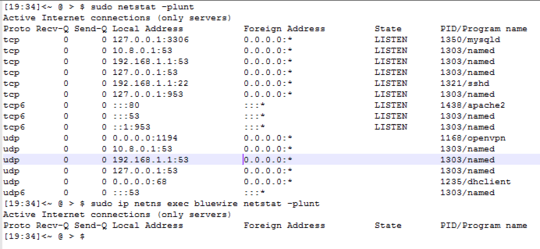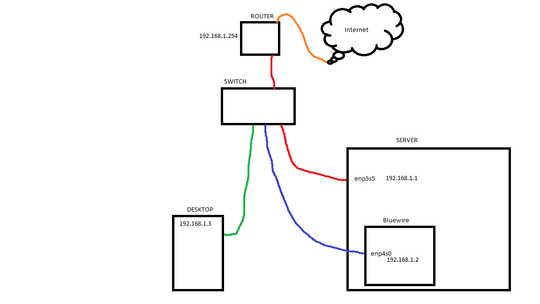4
I have an Ubuntu Server with two network interfaces and a namespace named "bluewire" (named after the color of the Ethernet cable connected to it).
The bluewire namespace has the enp4s0 interface added to it and is isolated from the WAN (which is desired). I can SSH with PuTTY from my desktop into the server itself via 192.168.1.1:22, but PuTTY throws a "Connection Refused" error when I try to connect through 192.168.1.2:22. I suspect the namespace is not listening to any ports at all.
The Delimma: How do I enable listening within the namespace so I can SSH in through the blue wire? Or if it's something other than a listening issue, what do I need to do to get SSH working through the blue wire?
Additional info:
- The UFW is open both on the server side and
ip netns exec bluewireside to OpenSSH. - The
iptablesrules for the bluewire namespace are wide open (everything set toACCEPT). - The server is pingable from the .2 address, it's just refusing the connection. After running an
ip netns exec bluewire tcpdump -n dst port 22, I can assume the server knows it's receiving a request from the desktop. - Running
netns -anreveals the server itself is listening to port 22, butip netns exec bluewire netstat -anturns up an empty table. That's where I suspect the problem is. - In case you're wondering why I have such a setup: The red wire connects the sever to the internet while the blue wire is blocked off from the internet. The reason being if I suspect my server is under attack (such as my private keys getting swiped), then I can disconnect or
ifdownthe red wire interface and restrict server access to the local network so I can SSH in only through the desktop to change the locks.
EDIT
Per Blerg's comment below, a screenshot of netstat -plunt

- Both interfaces are pingable through the Windows cmd on my Desktop.
- As far as I know the router isn't blocking any ports on the internal network; it just blocks all access from the outside world with the exception of 1194, which I use for OpenVPN. I can connect through the .1 interface without any problems using the desktop PuTTY so I doubt the router is the culprit... maybe.
My
/etc/ssh/sshd_configfile[07:28]<~ @ > $ cat /etc/ssh/sshd_config # Package generated configuration file # See the sshd_config(5) manpage for details # What ports, IPs and protocols we listen for Port 22 # Use these options to restrict which interfaces/protocols sshd will bind to #ListenAddress :: ListenAddress 192.168.1.1 ListenAddress 192.168.1.2 Protocol 2 # HostKeys for protocol version 2 HostKey /etc/ssh/ssh_host_rsa_key HostKey /etc/ssh/ssh_host_dsa_key HostKey /etc/ssh/ssh_host_ecdsa_key HostKey /etc/ssh/ssh_host_ed25519_key #Privilege Separation is turned on for security UsePrivilegeSeparation yes # Lifetime and size of ephemeral version 1 server key KeyRegenerationInterval 3600 ServerKeyBits 1024 # Logging SyslogFacility AUTH LogLevel INFO # Authentication: LoginGraceTime 120 PermitRootLogin prohibit-password StrictModes yes RSAAuthentication yes PubkeyAuthentication yes #AuthorizedKeysFile %h/.ssh/authorized_keys # Don't read the user's ~/.rhosts and ~/.shosts files IgnoreRhosts yes # For this to work you will also need host keys in /etc/ssh_known_hosts RhostsRSAAuthentication no # similar for protocol version 2 HostbasedAuthentication no # Uncomment if you don't trust ~/.ssh/known_hosts for # RhostsRSAAuthentication #IgnoreUserKnownHosts yes # To enable empty passwords, change to yes (NOT RECOMMENDED) PermitEmptyPasswords no # Change to yes to enable challenge-response passwords (beware issues with # some PAM modules and threads) ChallengeResponseAuthentication no # Change to no to disable tunnelled clear text passwords PasswordAuthentication no # Kerberos options #KerberosAuthentication no #KerberosGetAFSToken no #KerberosOrLocalPasswd yes #KerberosTicketCleanup yes # GSSAPI options #GSSAPIAuthentication no #GSSAPICleanupCredentials yes X11Forwarding yes X11DisplayOffset 10 PrintMotd no PrintLastLog yes TCPKeepAlive yes #UseLogin no #MaxStartups 10:30:60 Banner /etc/issue.net # Allow client to pass locale environment variables AcceptEnv LANG LC_* Subsystem sftp /usr/lib/openssh/sftp-server # Set this to 'yes' to enable PAM authentication, account processing, # and session processing. If this is enabled, PAM authentication will # be allowed through the ChallengeResponseAuthentication and # PasswordAuthentication. Depending on your PAM configuration, # PAM authentication via ChallengeResponseAuthentication may bypass # the setting of "PermitRootLogin without-password". # If you just want the PAM account and session checks to run without # PAM authentication, then enable this but set PasswordAuthentication # and ChallengeResponseAuthentication to 'no'. UsePAM yes [07:29]<~ @ > $

Well you obviously need sshd running inside the namespace...? – Daniel B – 2017-07-09T21:53:30.940
I've tried
ip netns exec bluewire service sshd start, but to no avail either. Is there something else I need to do to get sshd running within the namespace? – MrZander – 2017-07-09T21:59:03.800Because you only have a network namespace, this will just see sshd as already running, as per /var/run or whatever. You must start it manually, without your service manager. – Daniel B – 2017-07-10T05:38:24.737
I think I understand what you mean. But I don't fully understand what I need to do to get it working within the namespace. Would you mind explaining what I need to do or direct me to some literature that would explain it? – MrZander – 2017-07-10T14:36:23.637